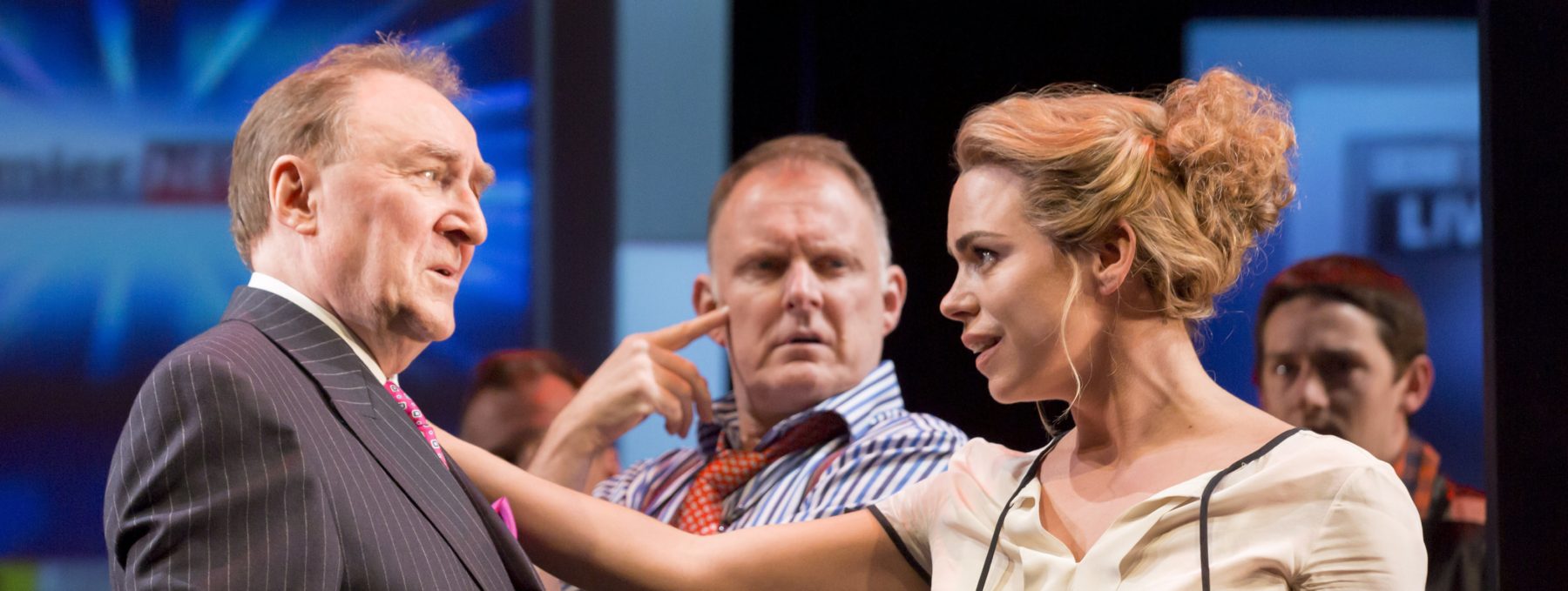Review: ‘Great Britain’
The National Theatre’s reputation as the pinnacle of London theatre comes from its incredibly selective repertoire; performing only the very best of plays with the most fitting of casts. Their current run of Great Britain is thankfully no exception. Richard Bean’s most recent play addresses many topical issues in a satirical manner, such as institutionalised racism, the apparent ineptitude of the police force, and the symbiotic relationship between the press, the police and politicians. The play is inherently satirical and incredibly refreshing, further proving that art is sometimes the very best tool for highlighting the issues within society in a thought-provoking manner.
The play focuses upon the work of a fictitious paper known as ‘The Free Press’ and the development of a phone hacking scandal, along with the thirst for power and information by the news editor Paige Britain (Billie Piper) It must be said that whilst it is clear that the play is based on the events behind ‘The News of the World’ and the subsequent phone hacking, both cast and crew alike have attempted to make the distinction clear between the content of the play and true events which does make the play enjoyable for those who did not follow the scandal intently.
Underlying themes of democracy and the often tenuous relationship between the right to privacy and the institution of free speech help push this play further into the realm of the continuously applicable, with a wonderful focus on how the apparently infallible democratic system we have can be manipulated by corporate interests. If Bean’s intent was to cause his audiences to consider the role of the media within our lives then it can very easily be said that he has succeeded.
Paige Britain as played by Billie Piper acts as both protagonist and narrator, who provides an alternative narrative to the phone hacking, legitimising the actions of The Free Press as an expression of democracy and demand for gossip masquerading as news. Piper’s role is captivating and the audience finds themselves torn between her characters compelling arguments and the search for justice in an unjust world. It has to be said that this is one of Piper’s finest roles, carrying the production forward.
However, that is not to diminish the role of the supporting cast, who are hilarious and wonderfully skilled in equal measure. Particular mention has to go to Oliver Chris as Asst. Commissioner Donald Doyle Davidson for his role as the (albeit skewed) moral compass of the play and also to Ian Hallard who played three separate characters so very well that I as a fan could not even recognise that they were the same actor. Along with an innovative staging and marvellous attention to detail from the director Nicholas Hytner, the entirety of the play comes together to form a brilliant piece of work that resonates with everyone who sees it.
Of course, no play is without its faults. The only truly significant issue (aside from the mice found in the National Theatre’s dressing rooms) is that the play does not offer any significant conclusion to the issues presented. The issues are complex indeed, but they are not unsolvable. Of course, this may have been a deliberate stylistic choice by Bean, and it does add a value of realism to the play, but I personally did find the conclusion slightly more empty than the rest of the play would have lead me to believe.
One of the defining aspects of this play was the level of secrecy that surrounded it during pre-production and rehearsals. With the preparations for the play beginning as early as May, one must compliment the creative team for the brave decision to forego previews and a significant amount of the publicity to help bolster the message behind the play, adding realism without making the play seem like a documentary of the phone hacking scandal.
The crowning glory of this production has to rest in the sheer hilarity of the entire performance; despite the fact the play addresses many chilling and controversial issues, whether that be the murder of teenage girls or Angela Merkel’s pregnancy. Technological interludes convey information in a humorous way, featuring fictitious headlines from papers such as ‘The Gardener’ and YouTube style spoofs of the bumbling Commissioner of the Met, a la ‘Nick Clegg Apology Song.’
With a more macabre play (not to say that Great Britain does not have its more poignant moments) the near three-hour length would have been off putting, but it is a credit to Richard Bean that his script was more than engaging enough to hold the audience’s interest, even in a tale that most of those present would know how it ends. Indeed, the play is truly one of the highlights in what has been a quite uninspiring summer season of London theatre and is a show that fully deserves its transition to the West End for a continued run.
Great Britain transitions to the Theatre Royal Haymarket from the 10th September with tickets now available.

Comments (1)